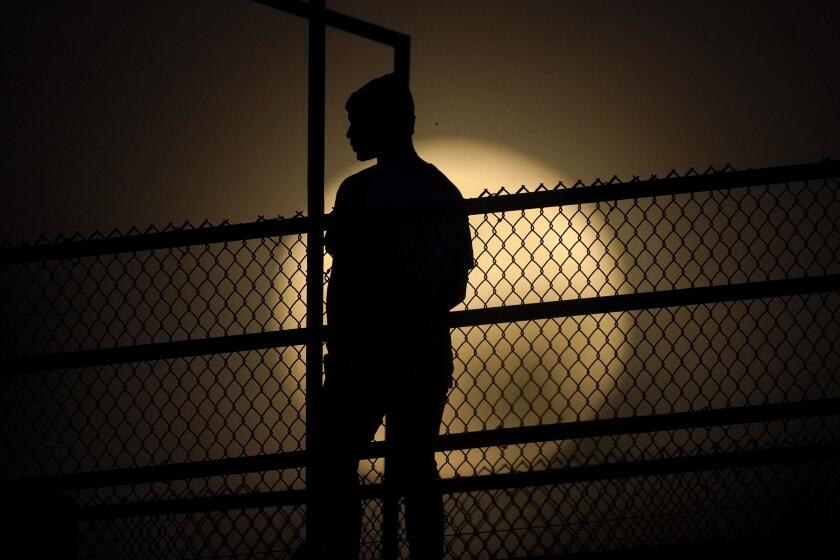Guest writer: We’re in the midst of a global loneliness crisis. Here’s how we can end it

- Share via
We are in the midst of a global loneliness crisis that struck long before “social distancing” entered our vernacular and our smiles were occluded by masks.
One in five millennials in the U.S. say they have no friends, according to a 2019 survey. Sixty percent of residents in U.S. nursing homes have no visitors. In Japan, people over 65 routinely commit crimes so they can avoid social isolation by living in jail. The problem is so acute, the United Kingdom appointed its first minister of loneliness in 2018.
This is the loneliest century humankind has ever known, but it didn’t emerge overnight. Our smartphones and particularly social media have played an integral role. So have large-scale migration to cities, the rise of a gig economy that has left many workers without a sense of workplace community, and fundamental changes to how we live.
In much of the world, people are less likely to attend a house of worship, belong to a parent-teacher association or trade union, or live with others than in the past. In recent decades, we’ve also become more individualistic. The evolution of pop lyrics since the 1970s bear this out — with words such as “we” and “us” being steadily replaced by those like “I” and “me.”
An “I”-focused world is inevitably a lonelier one.
The statistics seemingly know no end. In the United States, 15% of men say they have no close friends, an increase of more than 10 percentage points since 1990. In the Netherlands, almost a third of adults admit to being lonely. Three in five Brits between 18 and 34 say they feel lonely either often or sometimes. In the workplace, 40% of office workers globally say they feel lonely, and that was before we all began working from home.
Our mental health is not the only thing at stake, although loneliness is associated with increased rates of anxiety, depression and suicide. Loneliness damages our physical health as well. Hard-wired to connect, our bodies go into a state of high alert when we are lonely — stress hormones course through our veins, our heart rate and blood pressure go up. Loneliness is worse for us than not exercising or being obese, as detrimental to our health as smoking 15 cigarettes a day.
Lonely workers are less motivated, less productive and more likely to quit. Research shows that people without a friend at work are seven times less likely to be engaged with their job than those who feel they have such a bond.
Loneliness also can exact a price on democracy. A small-business owner in Milan told me about the brotherhood he felt at a far-right organization’s dinners where attendees sing traditional songs. A Parisian baker spoke of the isolation of urban living and how lonely he felt until he became a member of France’s far-right National Front party.
Right-wing populists have successfully wielded community like a sword, and not only in recent presidential politics in the United States. This is not a recent trend — in 1992 researchers established links between voters in France who felt socially isolated and their support of right-wing populist Jean-Marie Le Pen.
Millions of Americans are struggling through life with few people they can trust for personal and professional help, a disconnect that raises a barrier to recovery from the social, emotional and economic fallout of the COVID-19 pandemic.
To address the needs of this lonely century, we need more of what I call the Loneliness Economy: goods and services designed to alleviate loneliness and deliver connection.
A few months before the world went into pandemic shutdown, I engaged with its extremes by renting an above-board companion for $120 for an afternoon from a website with more than 600,000 friends for hire. For three hours in downtown Manhattan, we drank matcha tea, shopped for sunglasses and browsed my favorite bookstore. “Brittany” laughed winningly at my jokes.
Soon after, I repeated my pay-for-interaction experiment on the West Coast. In Venice Beach I hired Jean, a professional cuddler I also found online. During our hourlong session we had time to chat, her arms encircling me from the back, and she told me that business was booming.
For the loneliness economy to have impact, it will have to go beyond providing professional cuddlers and companions. We’ll need products and services that enable meaningful connection at scale.
We’ll need more places like colatecs — the South Korea daytime discos frequented by retirees — and social robots like Israel’s ElliQ, an artificial intelligence companion designed to keep older adults company that was popular in Florida at the height of the pandemic. And for readers skeptical about our ability as humans to feel close to robots or virtual companions, I offer my 2-year-old niece: When her mother asked who they should make their next greeting card for, she replied “Alexa.”
Employers can also make a dent in our loneliness. Even small steps can yield significant dividends. For example, researchers studying firefighters in Chicago found that companies that ate together felt more bonded and performed better than those that didn’t. Corporations that provide paid days off for employees to volunteer together report similarly significant results.
And, somehow, social media has to be reined in. Its incessant siren call means ever greater disconnection from those physically around us — and ever more exposure to vitriol and abuse, which exacerbates how lonely we feel.
In the U.S., all 50 states and Washington, D.C., have taken steps to prevent bullying and protect children, but no federal law exists to directly address it even though 60% of teens have experienced cyberbullying. In the United Kingdom, where a similar number of young people have been cyberbullied, the government has created a draft online safety bill that imposes a “duty of care” on social media platforms to protect individuals from psychological and physical harm.
More generally, all levels of government must commit to massively re-fund the infrastructure of community — vital gathering places such as libraries, playgrounds and youth clubs. This may give us the best possible chance of reversing the loneliness crisis and reconnecting with one another. Since the 2008 financial crisis, funding for community infrastructure has been slashed across much of the world. For instance, federal support for U.S. libraries decreased by more than 40% from 2008 to 2018, while the United Kingdom has closed nearly a fifth of its libraries, about 800 total.
Individuals also have clear roles to play. As we emerge from this prolonged period of social isolation, we can commit to making this a summer of reconnection. This means rushing less and stopping to talk more, whether to a neighbor, a postal carrier or someone who appears to be lonely. It means breaking out of our self-suffocating digital privacy bubbles and engaging with those around us, even when our default is to scroll on our phones. It means showing more gratitude to those who care for others in society and saying thank you more to our partners, our friends, our colleagues — even our Alexa.
We inadvertently built a lonely world, but it doesn’t have to remain that way.
Noreena Hertz is the author of “The Lonely Century: How to Restore Human Connection in a World That’s Pulling Apart.”
More to Read
A cure for the common opinion
Get thought-provoking perspectives with our weekly newsletter.
You may occasionally receive promotional content from the Los Angeles Times.









